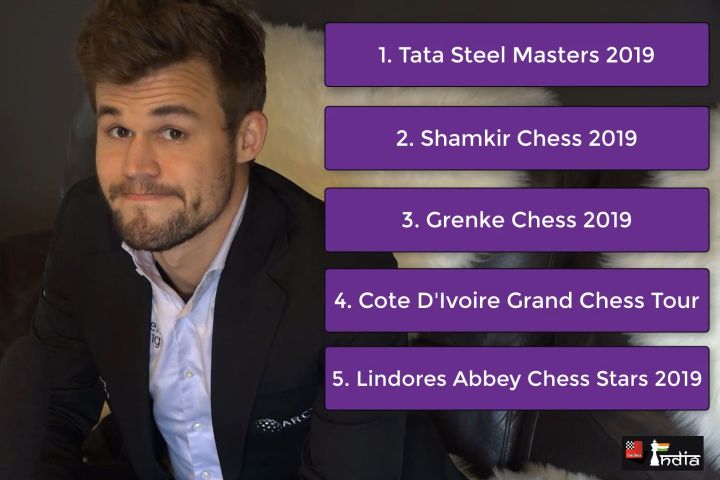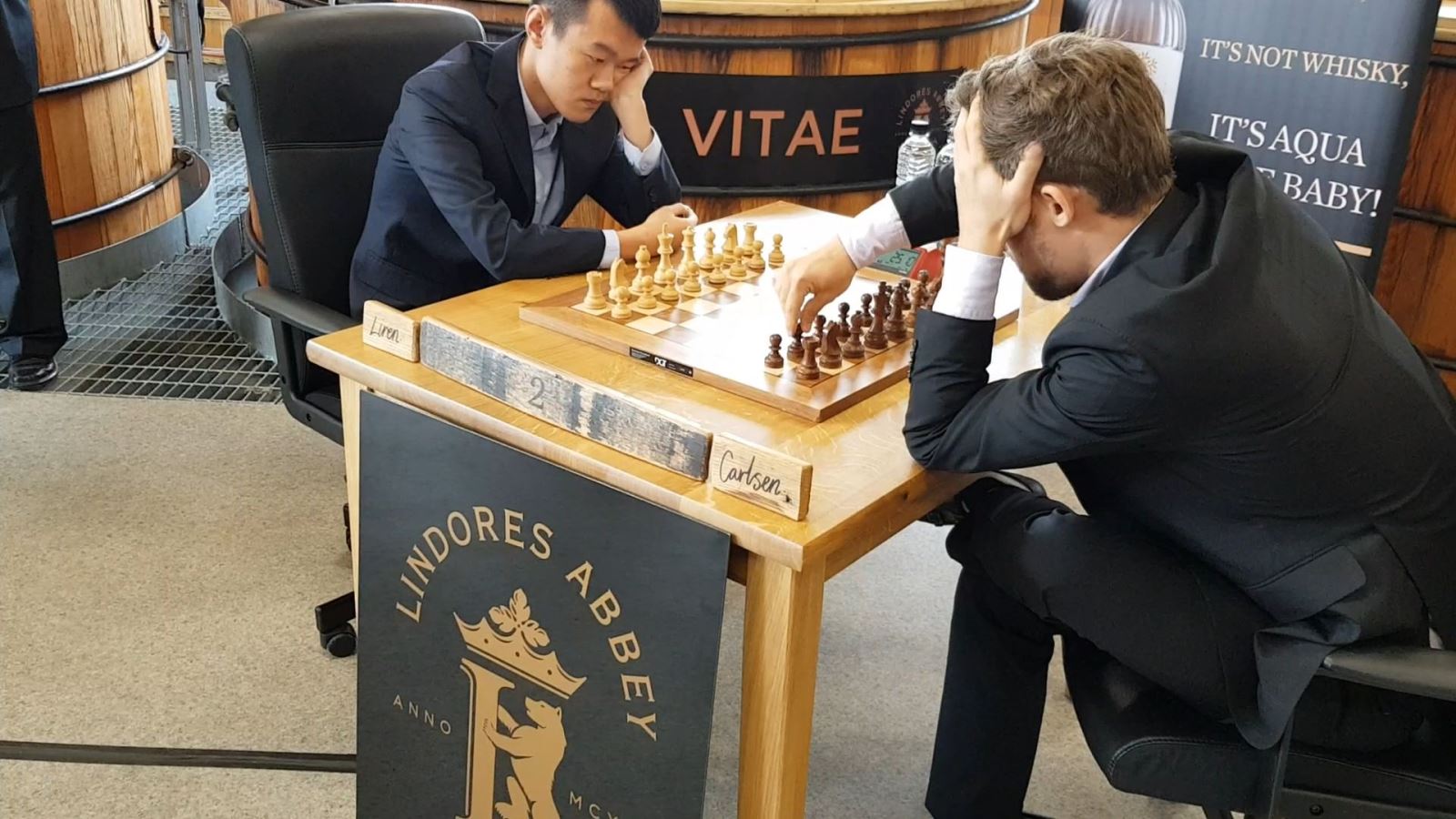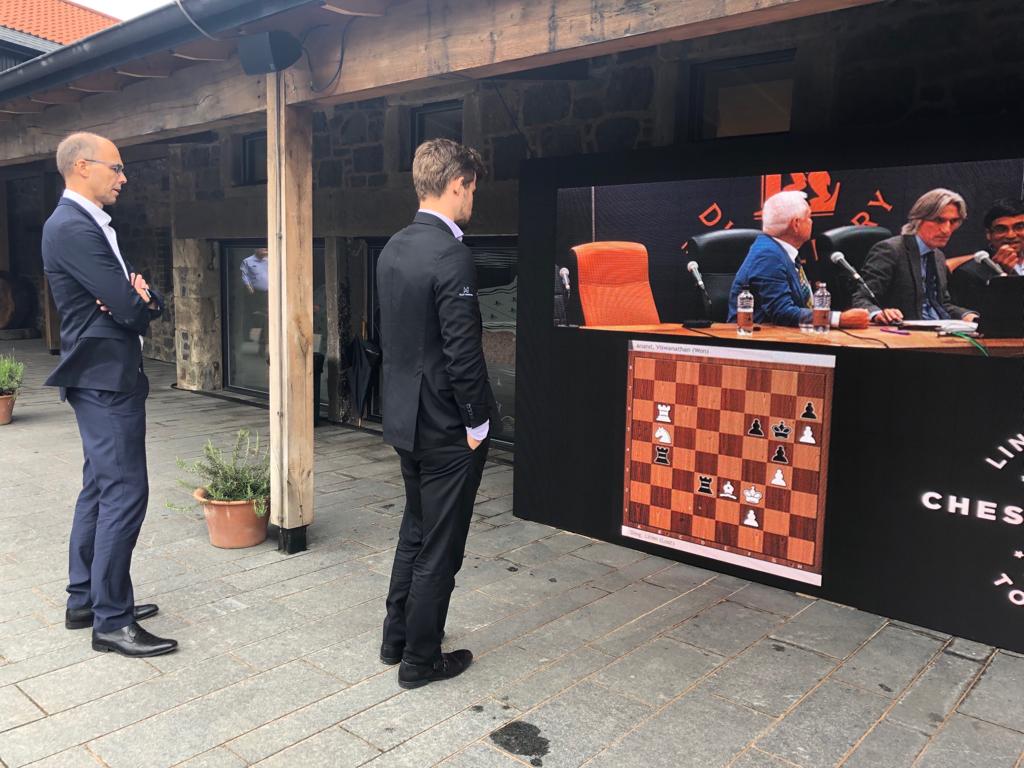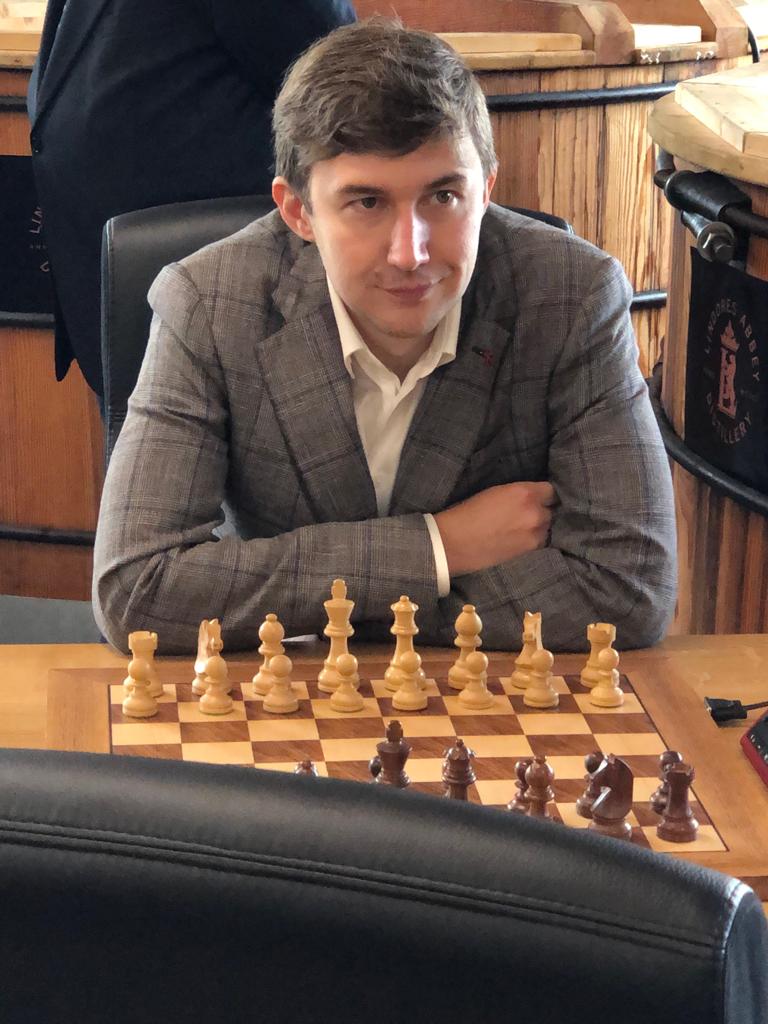


ChessBase 17 - Mega package - Edition 2024
It is the program of choice for anyone who loves the game and wants to know more about it. Start your personal success story with ChessBase and enjoy the game even more.
Magnus Carlsen and Ding Liren took their seats opposite each other. Their handshake didn't have any warmth or conviction. The entire tournament had boiled down to this final game. The Lindores Abbey Chess Stars tournament in Scotland was supposed to be relaxed, right? So why was the commentary section in the distillery bustling with hundreds of people? Why was Magnus Carlsen trying to get into the zone before the game. Why did Ding Liren have this stoic expression, wielding his silent willpower that has taken him to the top of world chess?
The more you think about it, the more you realize that this is all happening because of Magnus Carlsen. Carlsen winning the tournament these days taken for granted. But when he doesn't win it, no matter which event it is, it becomes big news! That's why things are always exciting when the world champion is in action.

Ding Liren had the unenviable task of beating Magnus to take the first place at the Lindores Abbey Chess Stars 2019
On would assume that Ding was not in the best possible frame of mind for this finale. He was decidedly better against Vishy Anand but things had gone completely downhill after he made one mistake after another.
The point to debate here is whether White can win this position or not. There are absolutely no chances for Anand in this position. But for Ding to win this is not easy because he has to create a weakness in the position. The Chinese GM thought that he could do this by pushing his h-pawn down the board. This he did and after a few moves we reach the following position:
The move g4 was already a critical mistake by Ding, because it allowed Anand to play this rook to a4 attack the pawn and then pin the knight with ♜b4. Ding had to make sure that he pressed the emergency brakes here. However, making the switch did not come easily. One mistake led to another and the final cookie crumbled here:
Here Ding had to play ♖d6 and after ♜xe3 and ♜xb5 the position would be drawn. Ding went for ♖b8 instead and after Anand's simple ♜db3, the game was over. Quite a disappointing loss for Ding, who could have gone into the lead with 3½/5 had he won this position. Instead, he was left on 2½/5.
One cannot help but feel sorry for Ding, especially after you see his reaction after he lost the game

Magnus the kibitzer cannot help but try to find how Ding lost that game!
Magnus Carlsen, on the other hand, in round five had reached an equal middlegame position against Sergey Karjakin. The players could have agreed to a draw by making some banal moves. But Carlsen, as he said in the post-game interview, was in "Kramnik mode". He was ambitious and perhaps it wasn't the most objective, but boy did the spectators have fun!
Now it was Sergey's turn for creative play, and he went for ...a4. Things would have ended quite peacefully had Magnus picked up the a4 pawn. However, when you have the will to fight hard, then you often find moves which are not the most obvious. Carlsen took on d5 and let Black push his pawn to a3, then a2 and even a1=♛!
It's true that White has only two minor pieces for the queen. However, Black has to be very accurate in case he wants to play for the win. While I was kibitzing the game live at the venue, I didn't even feel that Karjakin had the advantage. At least, Magnus' body language was extremely confident. As you can see from the analysis given below, Karjakin had to find the very accurate manoeuvre with ...♛a5 followed by ...♛b4 and he would have excellent chances to win. But once Magnus was able to get his pawn to c6 and b7, I think it's a fortress.
Although engines feel that this is better for Black, I think it is drawn and the further course of the game shows that. It was a great game of fighting chess by Magnus and Sergey.
The final four minutes of this crazy game captured on camera

Sergey Karjakin finished third with 3.0/6 | Photo: Jeroen van den Belt
There was just 20 minutes break between the two rounds.

While Ding was recovering from his loss to Anand, Magnus went for a nice little walk with his father
Ding Liren seemed to be in a completely different frame of mind. He was out for the kill. His opening play looked uninspired at first, but very quickly you could understand that looks can be deceiving.
This move e4 came as a surprise to Magnus. He took with ...♞xe4 but Liren had the next surprise prepared ♘h4! Suddenly it was clear that Carlsen had been outplayed.
Let's take stock of what we have here. White is a pawn up and logically this should be winning, right? I mean if you see such a game given in any book, then the player with the white pieces has most often won showing good technique. The problem here is that you have Magnus Carlsen, one of the finest endgame players of our time, sitting with the black pieces. Hence, Ding has to be careful, but at the same time he shouldn't be so overcautious that he is not able to take some calculated risks. Add to this the pressure of winning the tournament and I think it became a bit too much for the world no.3 to handle.
I would call this the critical position of the game. Here Ding spent nearly six minutes of his time to figure out a way to win. If you look at it, White has some important decisions to make. He cannot win by keeping the status quo. That's because the king would like to enter the kingside, but the rook on e2 guards it firmly. If you want the king to enter, then you need your rook to take an active part, but that would mean the sacrifice of the f2 pawn. Also, the b4 pawn isn't going to queen anytime soon. Its main purpose would be to distract Black so that White can enter the kingside. You can check the analysis given below. I have not been able to find a win, nor were the players able to in post-game conference. But I wouldn't be surprised if a win does exist.

Ding's father watched the entire final encounter patiently while Henrik tried to distract himself from the stress and tension by talking to Jonathon Grant | Photo: Kallia Kleisarchaki

By surviving difficult moments in both rounds five and six, Magnus won the tournament. Ding Liren was so close to victory, but it was not to be!

The participants along with the two men who made this event possible. Anton Buslov (left) and Drew Mckenzie Smith (right)
Magnus was given a full barrel of whisky as the winner. The whisky has not yet matured at the distillery as it has recently begun. Hence, Lindores Abbey Distillery will preserve Magnus' barrel, which contains approximately 150 litres of whiskey. Once it is matured, the distillery owners will contact Magnus as to what he would like to do with it. Usually whisky takes around three years to mature. The remaining three players receive a quarter barrel as a prize.
An exclusive ChessBase interview with Magnus Carlsen after he won the event

The chess world looks forward to Lindores Abbey Chess Stars becoming a regular super tournament in the calendar from 2020 onwards!